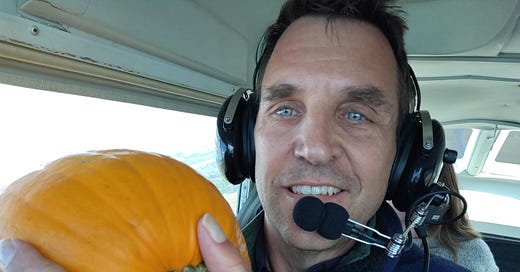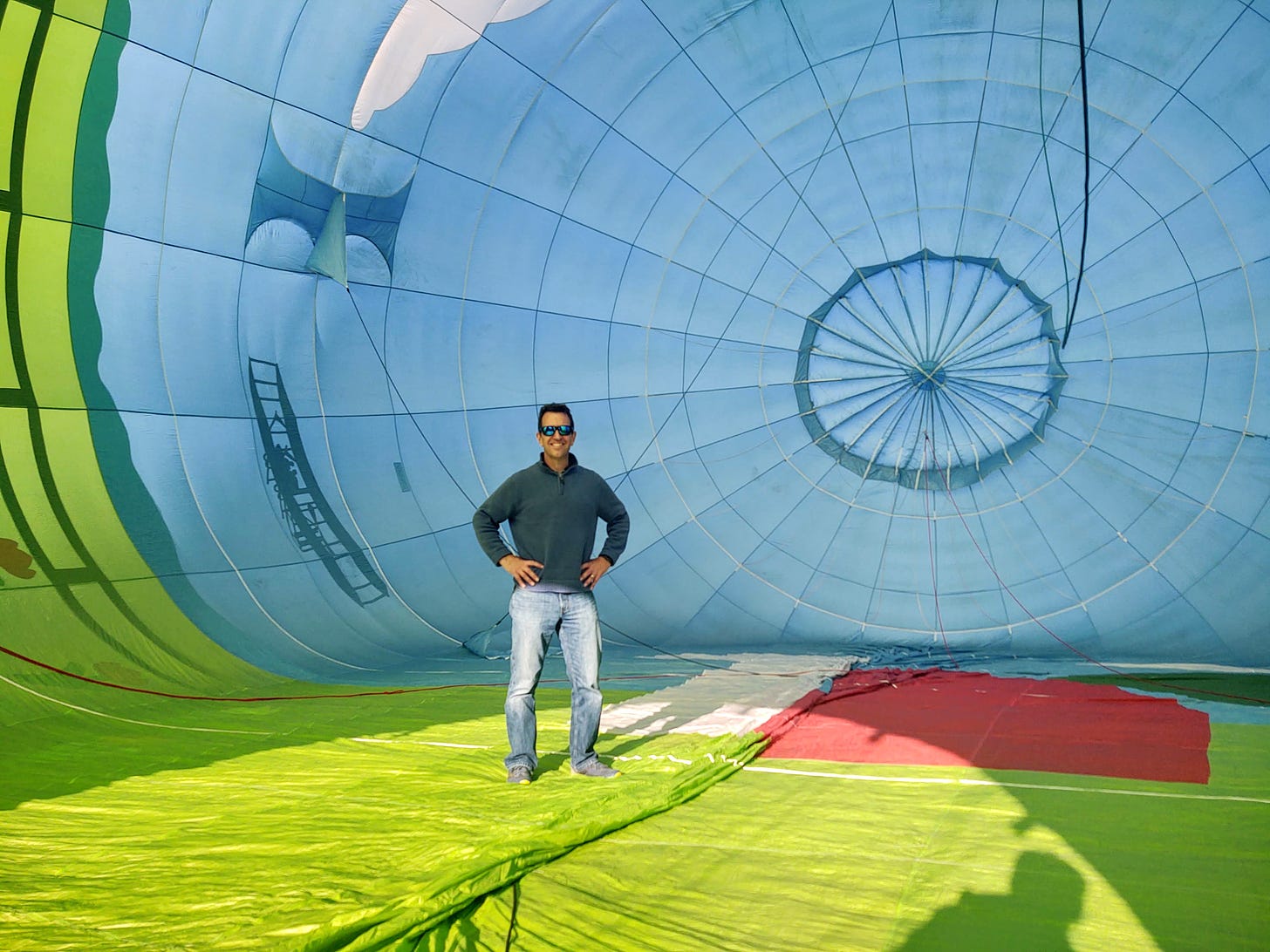On hot-air ballooning, pumpkin bombardiering and the power of learning new things
How your brain changes during novel experiences
“The balloon is yours,” Al Nels told me on Sunday afternoon, and suddenly, I was flying a hot air balloon for the first time.
Ohio farmland and pop-up forests rolled slowly below us. In the basket, I played in concert with the wind. It controlled our speed and direction. I controlled our height with a simple crank on the throttle of the burner. There was almost no sense of motion. I knew we were going up or down only by looking off to the side and watching the trees. You know how sometimes when you’re on an elevator you’re not sure if you’re moving? It was like that. It took me a minute to get used to NOT watching where we were going.
I was flying with Nels, a two-time national champion and two-time world champion, because he conceived a fascinating new app to make ballooning safer, more predictable and more accessible. I’ll have much more on that later.
What I want to focus on today is the fact I came away changed by the experience, and I mean that quite literally. My brain is different because I learned how to fly a hot-air balloon. My latest story for SUCCESS.com is about the health benefits of trying novel experiences. I wrote it before I went hot air ballooning, but my experience with Nels reinforced what I discovered in researching the story. As I wrote there:
When we experience something new and like it, our brain triggers a release of dopamine. Dopamine makes us experience pleasure. And the benefits of doing something novel extend beyond just feeling good. Learning makes our brains better. “Every time you learn a new fact or skill you change your brain,” says Lara Boyd, director of the Brain Behaviour Lab at the University of British Columbia, in a TEDx talk called “After This Your Brain Will Not Be The Same.”
The harder a skill is to learn, the better it is for your brain. “My research has shown that increase in difficulty, increased struggle if you will, during practice actually leads to both more learning and greater structural change in the brain,” Boyd said.
I was still pretty wired as I drove away a few hours after our flight.
I had the same feeling a week earlier after I spent an afternoon as a pumpkin bombardier. I entered a “competition” in which I threw three pumpkins out of an airplane and tried to hit a target on the ground. (Pro tip: Have friends like pilot Dan Hartman, who a) enter pumpkin dropping contests b) say yes when you ask, “can I be your pumpkin bombardier and write about it?” and c) two days later send you a giddy text that says, “can’t stop thinking about how awesome that whole experience was.” It was his first time as a pumpkin bombing pilot, and he had the same joy of learning I did.)
Both days I felt almost as if I could sense those structural changes Boyd talks about. It’s a sensation I chase often. I felt it after surfing, rock climbing, ice climbing, dog mushing and other “hobbies” I’ve tried in the last few years.
It’s not the cheapest way to live. My basement and garage are littered with athletic gear I no longer use. The golf clubs I once lugged around courses weekly and now get used yearly if that. I bought spikes when I trained to try to become an average high school athlete at 48 last spring and haven’t touched them since. My softball glove hasn’t caught anything since my church team disbanded eight years ago. My SCUBA gear … well I can’t find that; maybe I actually threw that away after using it once.
I’d rather try 100 things once then get really good at one thing. Part of that is just my nature. Part of it is my job offers opportunities to write about new things. Part of it is the euphoria that I had when I drove away.
Probably the biggest part is that time slows down when you learn new things. Your brain absorbs all of the information around you. I’ll remember Nels skimming the top of corn stalks and flying close enough to trees for me to grab leaves as souvenirs far more vividly that first time than I will if I ever do it again.
In the SUCCESS story, I quoted Michael Easter’s book The Comfort Crisis: “This explains why time seemed slower when we were kids,” he writes. “Everything was new then, and we were constantly learning.”
I want more of that.
---
In addition to the learning new things story, I had a couple pieces that I spent a ton of time on come out last week. I hope you’ll read them.
To celebrate me turning 50, my friends and I hiked 50 miles, biked 50 miles and canoed 50 miles, all in one withering five-day trip to Wisconsin. Read about it here.
Year 2 of MABA—Make America Burpee Again—is coming. It will be largely the same as last year: In January, MABA will be a nationwide challenge in which each participant will do 3,100 burpees. In the inaugural year, we did it just to do it. This year, we will do it for a purpose: To work toward ending loneliness. The motto: Fall down. Get Back Up. Together. More details to come.
—
If you like this newsletter, please share it with friends.




